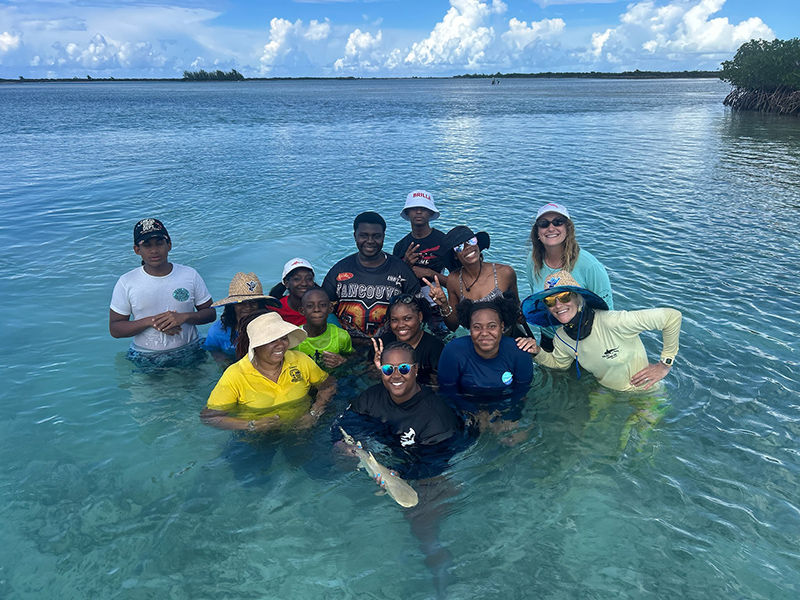Meet Ambassador Candace Fields
- Sharks4Kids

- Sep 10, 2022
- 3 min read

Originally from The Bahamas, I am a Ph.D. student under the joint supervision of Drs. Demian Chapman and Yannis Papastamatiou at Florida International University. After finishing my undergraduate degree in Pennsylvania, I spent two years at the Cape Eleuthera Institute in The Bahamas where I was a key member on the pelagic research team. My research will focus on the population dynamics and geographic population structure of large predators, with a particular focus on oceanic whitetip sharks. More specifically I will use a combination of genetics and tracking to understand more about this critically endangered species with the hopes of aiding in the recovery plan. I am passionate about shark conservation and being a Bahamian advocate for the protection and importance of sharks and rays in The Bahamas.
1. What is your favorite species of shark/ray and why?
My favorite shark species (right now, because I love them all) is the oceanic whitetip shark because I am lucky enough to study them and because The Bahamas is one of the last strongholds for this critically endangered species, I have been lucky enough to see and swim with them.
2. What is one species of shark/ray you would like to see/swim with/study and why?
I really want to swim with giant manta rays because I am in awe of their extreme beauty and grace and want to experience that up close.
3. Can you tell us a little about your current research?
I am currently a PhD student at Florida International University where I am studying the oceanic whitetip shark! My research aims to aid in the recovery plan of this species. I conduct genetic analyses and use movement data to understand the population structure and dynamics of the species. Additionally, I use baited remote underwater video station (BRUVS) surveys to assess relative abundance of sharks in coastal areas and in the open ocean of The Bahamas.

Candace and founder Jillian doing a scientific workup on a juvenile lemon shark
Credit Nova West
4. What is the most challenging aspect of studying sharks?
There are a handful of challenges that come with studying sharks, and I feel that these differ depending on what species you are targeting. In general, however I think the most challenging aspect is actually catching the animal. More times than not when conducting fieldwork, the day ends with zero sharks caught or zero sharks of the target species caught.
Also, many shark species are threatened on some level which inherently makes them harder to catch, and a lot of important work related to studying sharks starts by simply catching them.
5. What is the coolest thing you have ever seen while studying/diving with sharks?
The most memorable and exciting experience I have had was swimming with a whale shark right off of Cat Island, The Bahamas. I was on an expedition with Shark Explorers Bahamas team with two other people from the Cape Eleuthera Institute (CEI) and we were seeing a ton of bird activity. We followed the birds and came upon an amazing bait ball. After a couple people got into the water to film the bait ball they looked up and yelled that there was a whale shark feeding just below the surface in the middle of the ball. The rest of us were able to get in the water and swim with this extremely majestic animal while also being surrounded by diving seabirds, jumping tunas and other shark species. It was truly unforgettable.

Candace studying smalltooth sawfish. All sawfish research activities are conducted under
permits ESA22078 and NPS EVER-2019-SCI-0020
6. Why is education and awareness important for conservation?
Education and awareness are essential for conservation success stories. While gathering data is necessary for us to understand the level of threat animals face or important biological and ecological information, if we are not able to share this information with others and get other people interested and invested our conservation efforts will fall short. Conservation is a group effort. It is up to all of us, not just scientists and conservationists to help animals that are in need and if people are unaware of the challenges threatened animals face it will be impossible for them to work to combat them!
7. What message would you share with young women who are interested in pursuing a marine science career?
The message I can give to anyone who is interested in pursuing a career in marine science is that there is no one right path to take to get to your end goal. For example, my bachelor’s degree is in neuroscience and so I didn’t start doing marine related work until after I finished college. All that is to say that it’s never too late to dive into this field and follow your passion!






















